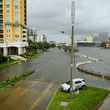If you spend even a small amount of your time enjoying the vast recreational resources of natural environments, you've likely found yourself needing little proof of catastrophic events in order to take a stand against hydraulic fracturing. Better known as fracking, hydraulic fracturing involves drilling deep into underground rock formations and injecting chemical-laden, pressurized water in order to create micro fractures that allow gas and oil which would otherwise be trapped to escape. Fracking operations involve mass-disruption of natural environments through the building of roads and drilling sites, generate millions of gallons of chemical and radiation laced wastewater, have been linked to contamination of groundwater, lakes, and rivers, and evidence continues to mount that establishes fracking operations as the cause of earthquakes around the globe.
Most recently, a series of earthquakes -- culminating in a 4.0 magnitude quake on New Year's Eve -- in Ohio, are being linked to drilling operations harvesting natural gas and oil from Ohio's Utica Shale formation. Scientists have stated that, like earthquakes which have been circumstantially linked to drilling operations in other locations, the links between drilling and subsequent earthquakes are persuasive. Repeatedly, earthquakes occur subsequent to drilling operations in direct proximity to wastewater injection wells and during time periods which match the establishment and operation of those wells. The State of Ohio found the link persuasive enough to shut down operation at 5 wells surrounding the recent Utica Shale formation quakes.
Rather than the fracturing process which establishes the extraction wells, it is the wastewater disposal portion of these drilling operations that has been linked to an increase in seismic activity. According to Larry Brown, chair of the Department of Earth and Atmospheric Sciences at Cornell University, as high pressure wastewater is injected into disposal wells, "it basically greases the wheels of the earthquake process that is there naturally and causes the earthquakes to occur at lower stress levels than they might normally have needed to occur," Reuters reports.
Similar links between wastewater injection wells and earthquakes are not uncommon. In recent years, geologists have established ties between drilling operations and quakes ranging from Oklahoma in the United States to the Lancashire coast in the United Kingdom. Scientists note that more studies need to be performed in order to prove an unquestionable link between fracking operations and earthquake activity, but urge that the evidence available provides a strong correlation between the two events.
Despite growing concerns over the impacts of hydraulic fracturing, energy companies continue to invest heavily in the future of fracking. Bloomberg reports that Total SA, Europe's third-largest oil company, and China Petrochemical Corp. dumped over $7 billion in investments into U.S. fracking operations in just the last two weeks.
With astronomical profits at the helm, proponents of tighter regulations or even bans on fracking operations will likely find an uphill battle ahead. Despite a history of questionable science, possible ties to catastrophic events, and accidents such as this April's pollution of a Pennsylvania brown trout stream, fracking operations continue to expand at a staggering rate.






























Comments
nawaralsaadi replied on Permalink
The solution is simple: waterless fracking, Gasfrac has already done over a 1000 fracks with gelled propane, no water is used, no waste water is produced and thus no need for injunction wells, and on top of it oil and gas production is enhanced with their method; it is a win for the industry and a win for the environment.
Pages